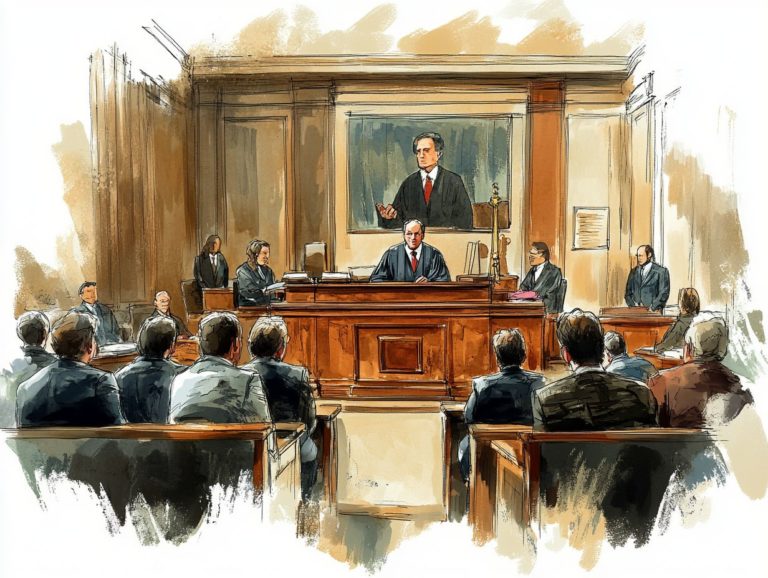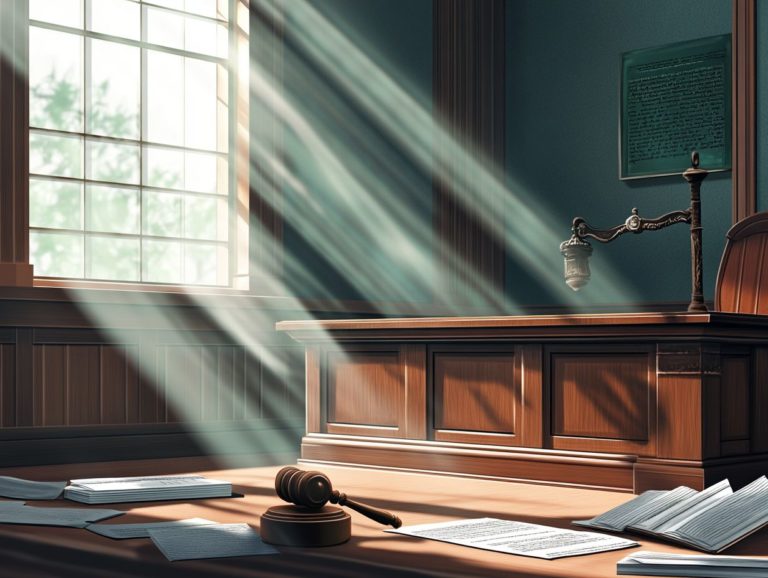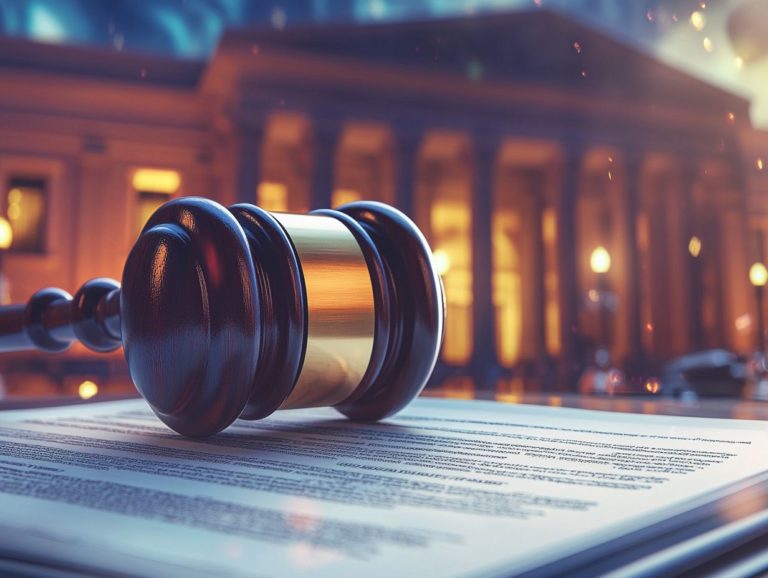Rights of the Accused: What Jurors Should Know
In the justice system, you play a crucial role in safeguarding the rights of the accused.
Understanding fundamental principles, such as the presumption of innocence and the right to a fair trial, is essential for anyone serving on a jury. Misconceptions can easily cloud your judgment, making it vital to clarify these rights.
This article will help you understand your important responsibilities as a juror, the implications of violating these rights, and how you can make a difference in the courtroom.
Explore with us the profound connection between jurors and the rights of those standing trial.
Contents
- Key Takeaways:
- The Role of Jurors in the Justice System
- Rights of the Accused in the Courtroom
- Common Misconceptions About the Rights of the Accused
- How Jurors Can Protect the Rights of the Accused
- Implications of Violating the Rights of the Accused
- Frequently Asked Questions
- What are the rights of the accused?
- Do jurors need to be aware of the rights of the accused?
- What is the right to a fair and speedy trial?
- Can the accused remain silent during their trial?
- What is the role of an attorney in protecting the rights of the accused?
- What happens if a juror believes the accused’s rights have been violated?
Key Takeaways:
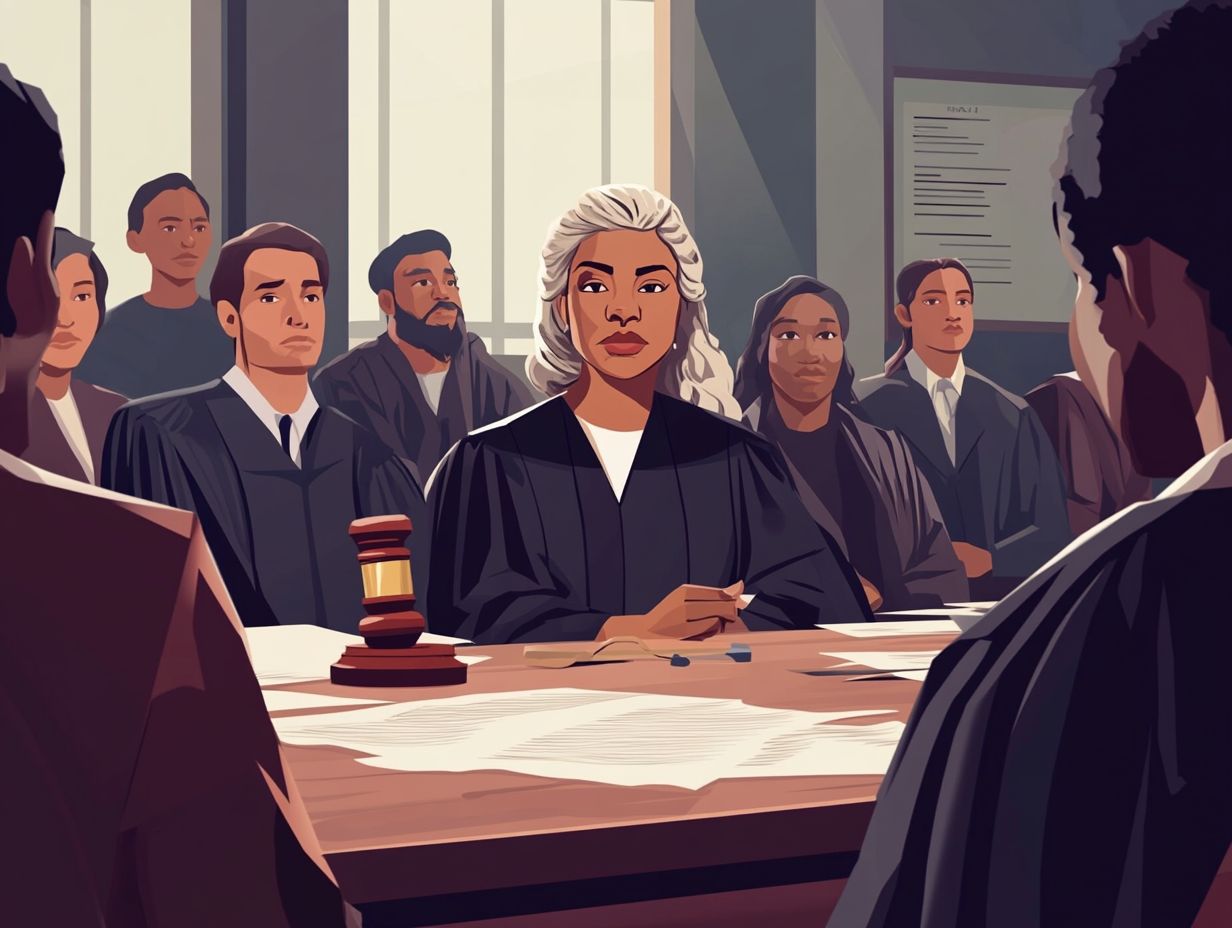
Jurors play a crucial role in the justice system by ensuring the rights of the accused are respected and upheld. The top 5 rights of the accused, such as the presumption of innocence and the right to a fair trial, are essential for a just legal process. Jurors must understand and protect these rights in the jury room to avoid negative implications for the justice system and themselves.
Stay informed to protect justice!
The Role of Jurors in the Justice System
Jurors hold a vital position in the justice system, serving as community representatives in criminal trials that uphold individuals’ constitutional rights.
Your responsibility goes beyond mere impartiality; it encompasses the duty to ensure that due process means that you have the right to fair treatment through the normal judicial system.
In the United States, you help protect the principle of trial by jury, a cornerstone of democracy and a fundamental aspect of fair legal proceedings.
Understanding the Importance of Jurors
Understanding the significance of jurors is crucial for appreciating their vital role in upholding a fair and just legal system. Jurors act as the essential bridge between the legal framework and the community, ensuring that a variety of perspectives are represented during trials.
This connection cultivates a sense of responsibility among citizens, as you play a direct role in the decision-making processes that uphold justice.
The presence of jurors from diverse backgrounds increases the likelihood that verdicts will reflect societal values, thereby bolstering public trust in the justice system as a whole.
Ultimately, the deliberations of juries not only impact individual cases but also reinforce the community’s commitment to maintaining fairness and objectivity in legal proceedings.
Rights of the Accused in the Courtroom
The rights of the accused in the courtroom are essential pillars of the justice system, primarily anchored in the Sixth Amendment. This guarantees you a fair trial, legal representation, and due process.
These rights enable you to mount an adequate defense against the charges leveled against you, thereby upholding the integrity of the legal framework in the United States.
Presumption of Innocence
The presumption of innocence is a vital principle in the justice system that safeguards your rights as the accused. This foundational tenet ensures that you are treated fairly until proven guilty, reinforcing the notion that mere accusations do not imply guilt.
It shapes the entire course of legal proceedings, urging judges and juries to evaluate evidence critically, free from biases influenced by public opinion or preconceived notions.
By upholding this principle, the system emphasizes the importance of due process, allowing you the opportunity to mount a robust defense while fostering trust in the judicial framework.
The presumption of innocence not only protects you but also strengthens the integrity of justice as a whole.
Right to a Fair Trial
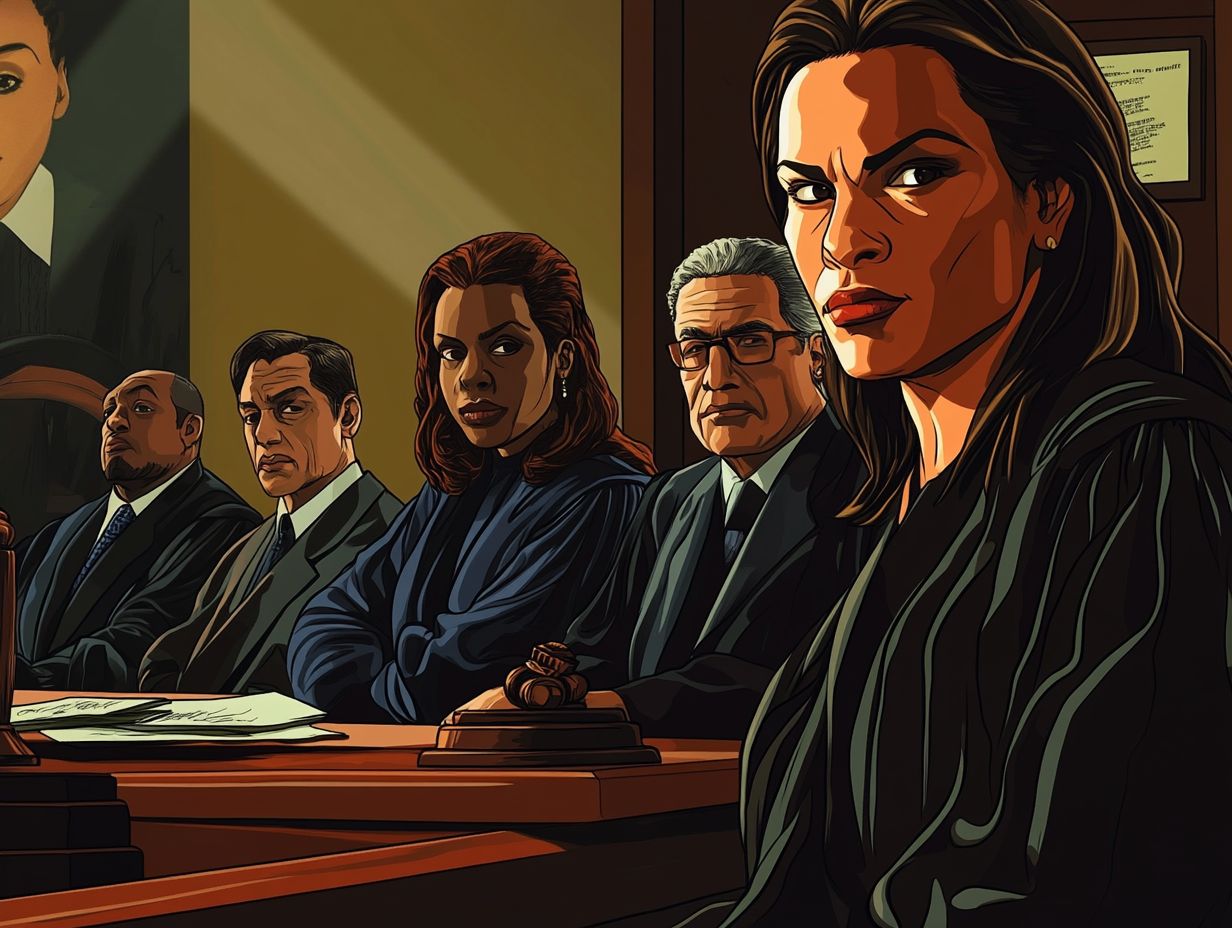
The right to a fair trial, as enshrined in the Sixth Amendment, is not just a legal formality. It is the cornerstone of a functioning democracy. This fundamental principle guarantees that you, an individual accused of a crime, are afforded a fair opportunity to present your case before an objective tribunal.
Central to this process is the role of an impartial jury. This jury is composed of citizens who assess the evidence without bias or preconceived notions. Legal standards like the presumption of innocence and the burden of proof are vital in upholding justice.
These elements work together to maintain public confidence in the judicial system. They protect you from wrongful convictions and emphasize the vital importance of fair treatment in the legal system.
Right to an Attorney
The right to an attorney is a cornerstone of the legal process, as underscored by the important ruling in Gideon v. Wainwright. This ruling said that states must provide legal counsel to defendants who cannot afford an attorney. It recognizes that without representation, one s right to a fair trial is at serious risk.
Since Gideon, the implications have been significant. This ruling has transformed the landscape of public defense and ensured that the accused have a greater opportunity for fair representation in criminal trials.
By granting access to lawyers, it levels the playing field. This enables you to navigate the complexities of the justice system with the guidance and expertise you deserve. Ultimately, this leads to more equitable outcomes.
Common Misconceptions About the Rights of the Accused
Common misconceptions about the rights of the accused can create significant misunderstandings about fair treatment in the legal system. Recognizing these misunderstandings is key to navigating the legal system effectively and ensuring that justice is upheld for all individuals involved.
Clarifying Misunderstandings
Clarifying misunderstandings surrounding the rights of the accused is essential for fostering a fair legal environment. Many individuals mistakenly view legal representation as merely a choice when facing criminal charges. This misconception can lead to dire consequences.
The truth is that navigating the legal system without an attorney can result in unjust treatment. Complex laws and procedures are often challenging for the average person to grasp. This leaves them feeling vulnerable and helpless.
Not understanding can cause serious problems for the accused. Acknowledging the importance of having competent legal counsel not only fortifies the defense but also upholds the integrity of the judicial process. This ensures that justice is served fairly for all involved.
How Jurors Can Protect the Rights of the Accused
Jurors hold a crucial responsibility in safeguarding the rights of the accused. They must ensure that due process is meticulously followed during the trial. Their involvement is essential in upholding justice and maintaining the integrity of the legal system.
Recognizing and Upholding Rights in the Jury Room
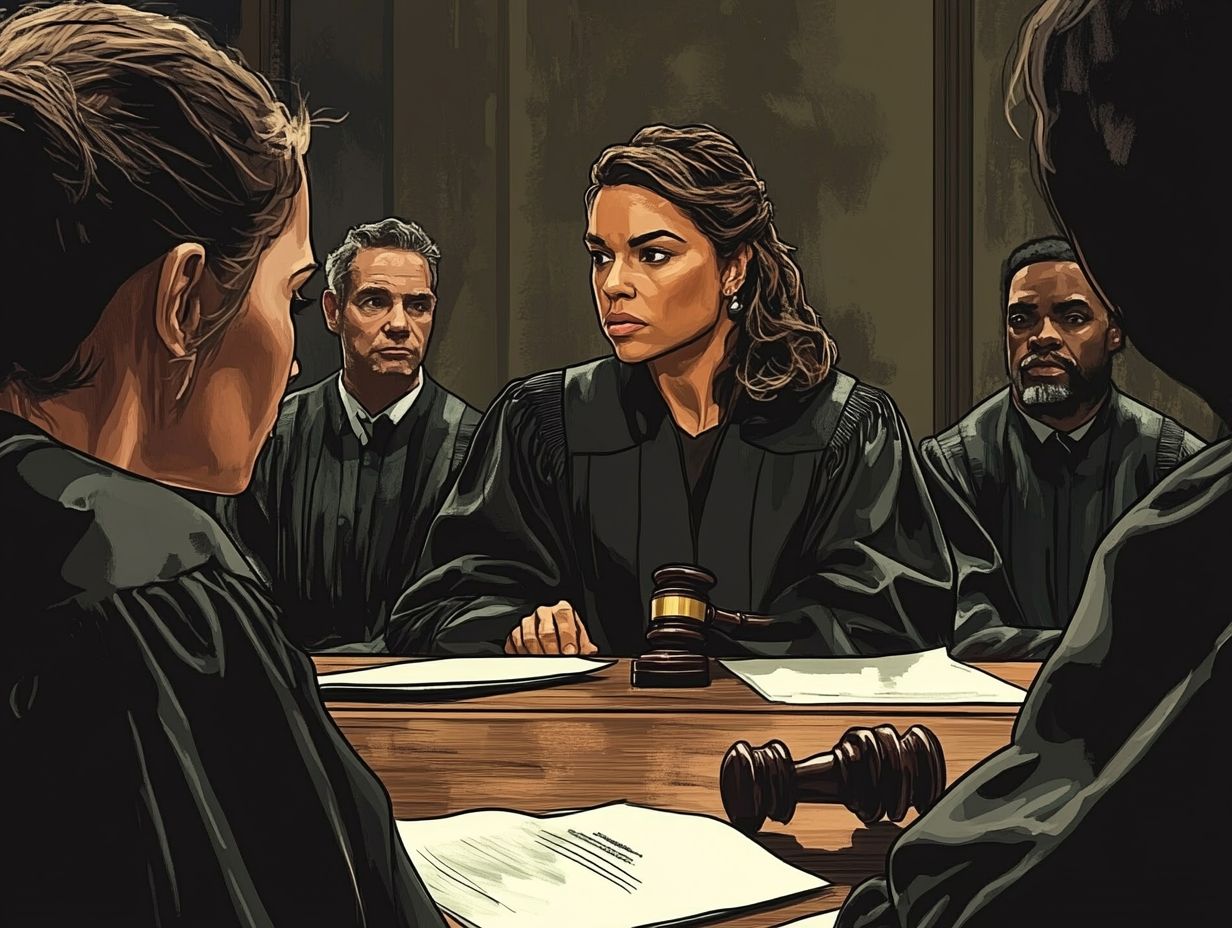
Recognizing and upholding the rights of the accused in the jury room is a fundamental responsibility that rests on your shoulders as a juror. This duty demands that you actively identify any preconceived notions or potential biases that may cloud your judgment.
By engaging in self-reflection and embracing the principles of fairness and justice, you can foster an unbiased environment during deliberations. Be mindful of your past experiences and societal influences that might color your perceptions of the case.
It’s crucial for you to remain focused on the evidence presented. Adhering to the rule of law ensures that the accused receives a fair trial free from undue influence. Techniques like open discussions with fellow jurors can aid you in recognizing and addressing any biases. This reinforces the integrity of the judicial process.
Implications of Violating the Rights of the Accused
Violating the rights of the accused can have serious consequences. It can damage public trust and undermine the basic rule of due process.
Every infringement not only affects individuals but also impacts society as a whole. This threatens the fairness and accountability within our legal system.
Consequences for the Justice System and Jurors
Neglecting the rights of the accused has far-reaching effects. It impacts individual cases and the integrity of the entire justice system.
When jurors do not ensure a fair trial, the consequences can ripple through many cases. This can lead to retrials and greatly diminish public confidence in courts.
This decline in trust makes citizens question the fairness of legal outcomes and the effectiveness of protections designed to uphold due process.
Jurors have a significant responsibility. They must evaluate evidence impartially and balance protecting rights with delivering justice.
Failing to uphold these principles doesn’t just jeopardize one case. It threatens the trust the public places in our legal system.
Frequently Asked Questions
What are the rights of the accused?
The rights of the accused include protections for those facing criminal charges. They ensure a fair trial, the right to remain silent, access to an attorney, and the presumption of innocence until proven guilty.
Do jurors need to be aware of the rights of the accused?
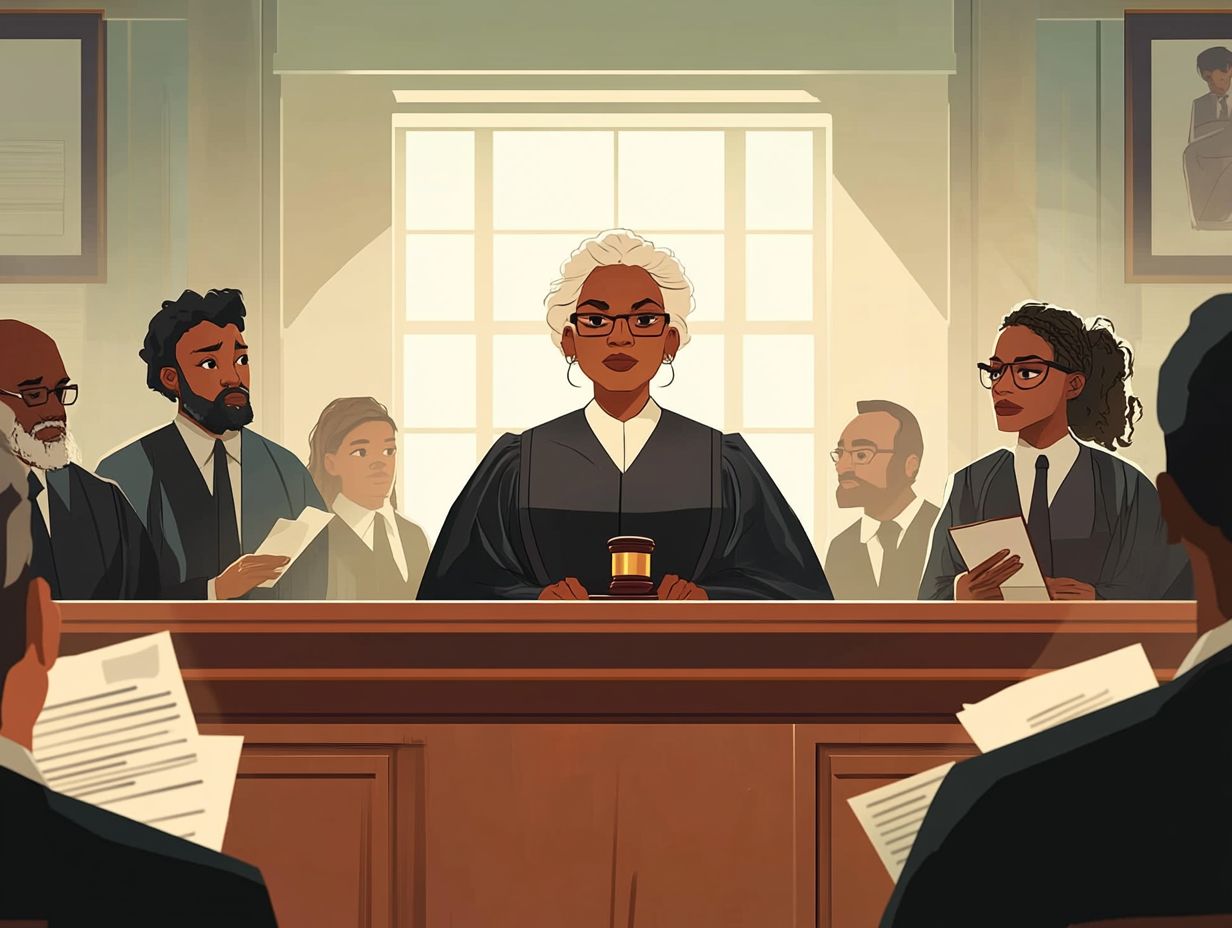
Yes, jurors must understand these rights of the accused. They play a vital role in ensuring that the accused’s rights are respected during the trial.
What is the right to a fair and speedy trial?
The right to a fair and speedy trial ensures that the accused receives a timely and impartial hearing. This prevents prolonged incarceration without a trial and avoids unnecessary delays.
Can the accused remain silent during their trial?
Yes, the Fifth Amendment allows the accused to remain silent. They are not required to testify or provide self-incriminating information. The burden of proof lies on the prosecution.
What is the role of an attorney in protecting the rights of the accused?
An attorney is essential in safeguarding the rights of the accused. They help ensure a fair trial and protect constitutional rights throughout the trial process.
What happens if a juror believes the accused’s rights have been violated?
If a juror thinks the accused’s rights have been violated, they should inform the judge immediately. The judge will take necessary actions to address the issue and maintain a fair trial.

